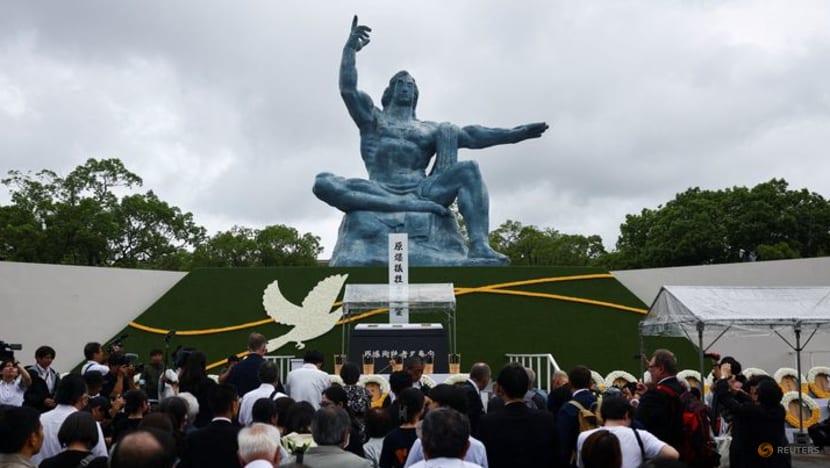Commentary: Why fears about Japan going nuclear are likely overblown
The atomic weapons taboo remains just that, says this Seoul-based analyst.

Attendees pray for the victims in front of the Nagasaki Peace Statue on Aug 9, 2025, to commemorate the 80th anniversary of the bombing of the city. (Photo: Reuters/Issei Kato)
SEOUL: Concern about a potential nuclear arms race in Asia has been growing ever since North Korea’s first atomic test in 2006, which served as a wake-up call to the international community and regional neighbours. While much attention has focused on South Korea’s growing nuclear weapons debate, Japan has also begun reconsidering its nuclear options more seriously.
Recent years have seen increased doubts about the reliability of America’s nuclear umbrella among US allies in Asia, particularly following Russia’s invasion of Ukraine. This uncertainty has prompted some Japanese lawmakers, especially from the minor opposition party Sanseito, to advocate for a “Plan B” to secure Japan’s long-term defence. These calls have only grown louder since Donald Trump’s election, given the widespread perception of his unpredictability.
However, such voices represent only a small minority within Japanese political circles and among the general public. The nuclear weapons debate carries exceptional sensitivity in Japan, given its unique status as the only nation to suffer direct nuclear attacks. Public opposition to nuclear weapons has remained strong for decades, deeply rooted in the lasting trauma these attacks inflicted on Japanese society.
80TH ANNIVERSARY OF THE ATOMIC BOMBINGS
This year marked the 80th anniversary of the atomic bombings of Hiroshima and Nagasaki. Speaking at a commemorative event earlier this month, Hiroshima Mayor Kazumi Matsui warned against the growing acceptance of military build-ups and nuclear weapons use for national security, citing ongoing conflicts in Ukraine and the Middle East. He also pressed the Japanese government to sign and ratify the Treaty on the Prohibition of Nuclear Weapons (TPNW), which Tokyo has declined to do, citing its dependence on US nuclear deterrence.
Despite this reliance on American nuclear protection, Japan has consistently championed international non-proliferation efforts. Each year, Tokyo advocates for a nuclear-free world at the United Nations. Japan once again leveraged its unique position to reinforce this message at the last UN General Assembly, declaring that “Understanding the reality of the atomic bombings is the starting point of all efforts toward nuclear disarmament.”
In the same statement, Japan called for strengthening the Nuclear Non-Proliferation Treaty (NPT) and committed to “work unwaveringly with the international community toward the achievement of a world without nuclear weapons, through realistic and practical efforts”. In addition, Japan is also co-author of a draft UN resolution titled Steps To Building A Common Roadmap Towards A World Without Nuclear Weapons.
Even if Japan were willing to risk its international reputation to pursue nuclear weapons, it faces substantial legal obstacles. Article 9 of Japan’s Constitution explicitly renounces “the threat or use of force as a means of settling international disputes” and states that “the right of belligerency of the state will not be recognised”. The 1955 Japanese Atomic Energy Basic Act further prohibits any military use of nuclear technology. As an NPT signatory, Japan is legally bound by Article 2, which prohibits receiving, manufacturing, or seeking assistance in developing nuclear weapons.
Japan also signed an Additional Protocol in 1998, granting the International Atomic Energy Agency expanded verification powers to ensure civilian nuclear facilities and materials are not diverted for military purposes. Beyond these binding obligations, Japan has long upheld the Three Non-Nuclear Principles: “not possessing, not producing and not permitting the introduction of nuclear weapons, in line with Japan’s Peace Constitution.”
THE COSTS WOULD FAR EXCEED POTENTIAL BENEFITS
Recent polling confirms majority opposition to nuclear armament among the Japanese public, with over 70 per cent of respondents surveyed earlier this year supporting Japan’s ratification of the TPNW.
Besides domestic opposition, pursuing nuclear weapons would create severe international consequences. China would view Japanese nuclearisation as a major provocation, likely transforming the already strained relationship between the countries into outright hostility. North Korea would almost certainly respond with increased military provocations, potentially creating a dangerous escalation cycle that could push South Korea toward its own nuclear programme. Rising regional tensions could also destabilise the Taiwan situation and lead the region closer to conflict.
The US would also be placed in a precarious position, with the fate of its approximately 60,000 military personnel in Japan called into question. The broader international community would likely impose swift economic sanctions, isolating Japan diplomatically and reducing it to pariah state status.
In short, Japan would be less safe, regional tensions would soar, and other countries could choose to follow Tokyo’s lead, to the further detriment of international peace and security.
Fortunately, Japan appears unlikely to pursue this path despite concerns about American alliance commitments. The memory of atomic devastation remains deeply embedded in Japanese society, and the government continues to officially oppose weapons of mass destruction. Earlier this month, Japan’s Prime Minister’s Office reaffirmed that the country “will not possess nuclear weapons”, has no intention of revising its Three Non-Nuclear Principles, and remains committed to “a world without nuclear weapons”.
The costs of nuclear armament would far exceed any potential benefits, and the risks could precipitate the very outcome Japan seeks to avoid: armed conflict. Japan’s path forward lies not in nuclear weapons, but in strengthening existing security partnerships while continuing to lead the global disarmament movement.
Gabriela Bernal is a North Korea analyst based in Seoul. This commentary first appeared on Lowy Institute's blog The Interpreter.














